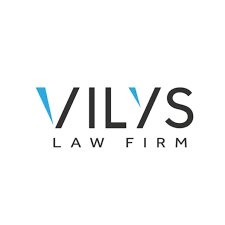Best Transportation Lawyers in Vilnius
Share your needs with us, get contacted by law firms.
Free. Takes 2 min.
List of the best lawyers in Vilnius, Republic of Lithuania
About Transportation Law in Vilnius, Republic of Lithuania
Transportation law in Vilnius, Republic of Lithuania, encompasses various legal aspects related to the movement of people and goods within the metropolitan area and beyond. Vilnius, as the capital city, is a bustling hub with a complex network of public transportation, including buses, trams, and trolleys, as well as private and commercial vehicles. The regulation of these transportation modes is critical to ensuring safety, efficiency, and compliance with both national and EU standards. The legal framework covers licensing, traffic regulations, public transit rules, and commercial logistics.
Why You May Need a Lawyer
There are several common situations where legal expertise in the field of transportation may be required in Vilnius:
- Traffic Violations: If you receive a citation or are involved in a dispute concerning traffic rules.
- Accidents: Legal assistance may be necessary to address liability and compensation issues in the event of a road accident.
- Commercial Transport Issues: Navigating the regulations governing the logistics and freight industry.
- Licensing and Permits: Assistance when obtaining or disputing the denial of permits and licenses related to transportation operations.
- Public Transport Disputes: Legal representation in cases involving public transport authorities.
Local Laws Overview
Several key legal aspects are relevant to transportation in Vilnius:
- Road Traffic Regulations: These include rules on speed limits, right-of-way, and the use of safety equipment, governed by Lithuania's Road Traffic Code.
- Vehicle Registration and Licensing: All vehicles must be registered, and drivers must possess the appropriate licenses.
- Public Transport Policies: Operated by "Vilniaus viešasis transportas" (Vilnius Public Transport), subject to municipal regulations ensuring safety and service reliability.
- Environmental Regulations: There are specific environmental standards and restrictions concerning vehicle emissions and the promotion of sustainable transport options.
- Freight and Logistics Regulations: Rules surrounding cargo transport, including safety standards for commercial vehicles.
Frequently Asked Questions
What should I do if I receive a traffic ticket in Vilnius?
It is advisable to pay the fine or contest the ticket, depending on the circumstances. Consulting a lawyer can help you understand your options and the best course of action.
How can I register my vehicle in Vilnius?
To register a vehicle, you must visit the local "Regitra" office and provide required documentation such as proof of ownership, identity, and insurance coverage.
What are the penalties for driving without a license in Vilnius?
Driving without a valid license can result in fines, and repeated offenses may lead to more severe penalties, including potential suspension of the ability to obtain a license.
Am I required to wear a seatbelt in Vilnius?
Yes, wearing seatbelts is mandatory for all passengers in a vehicle. Failure to comply can result in fines.
How can I dispute a parking fine?
You can dispute a parking fine by filing an appeal with the local municipal authority. Providing evidence and a succinct explanation through legal assistance can improve your case.
What are the rules for using public transport in Vilnius?
Passengers must purchase and validate tickets before boarding. Rules on courtesy and safety must be observed at all times on public transportation systems.
How does the city regulate emissions from vehicles?
Vehicle emissions are regulated by environmental standards enforced by the Ministry of Environment, including periodic emissions testing for compliance.
Can bicycles be used on all roads in Vilnius?
Bikes may be used on most roads, but bicyclists should use designated bike lanes where available and observe relevant traffic laws.
What is the legal blood alcohol content (BAC) limit for drivers?
The legal BAC limit for drivers in Lithuania is 0.04%. There are zero-tolerance policies for learner and professional drivers.
Who do I contact if involved in an accident?
In the event of an accident, contact the police and emergency services. It is crucial to exchange information with other parties involved and document the scene if possible.
Additional Resources
Here are some recommended resources and organizations for those seeking legal advice or information about transportation in Vilnius, Republic of Lithuania:
- Ministry of Transport and Communications: Offers information on national transportation policies and regulations.
- Regitra: The state enterprise responsible for vehicle registration and driver licensing.
- Vilniaus viešasis transportas: The main public transport operator in Vilnius.
- Lithuanian Road Administration: Oversees traffic safety and road maintenance.
- Lithuanian Bar Association: Provides a directory of certified lawyers, including those specializing in transportation law.
Next Steps
If you require legal assistance in transportation-related matters, consider the following steps:
- Research and identify a lawyer specializing in transportation law in Vilnius.
- Gather relevant documents related to your issue, such as tickets, accident reports, and correspondence with authorities.
- Schedule a consultation to discuss your situation and explore legal options.
- Follow the advice of your legal representative to address or resolve your issue effectively.
Taking these steps can help ensure that you are well-prepared to navigate the legal landscape of transportation in Vilnius.
Lawzana helps you find the best lawyers and law firms in Vilnius through a curated and pre-screened list of qualified legal professionals. Our platform offers rankings and detailed profiles of attorneys and law firms, allowing you to compare based on practice areas, including Transportation, experience, and client feedback.
Each profile includes a description of the firm's areas of practice, client reviews, team members and partners, year of establishment, spoken languages, office locations, contact information, social media presence, and any published articles or resources. Most firms on our platform speak English and are experienced in both local and international legal matters.
Get a quote from top-rated law firms in Vilnius, Republic of Lithuania — quickly, securely, and without unnecessary hassle.
Disclaimer:
The information provided on this page is for general informational purposes only and does not constitute legal advice. While we strive to ensure the accuracy and relevance of the content, legal information may change over time, and interpretations of the law can vary. You should always consult with a qualified legal professional for advice specific to your situation.
We disclaim all liability for actions taken or not taken based on the content of this page. If you believe any information is incorrect or outdated, please contact us, and we will review and update it where appropriate.















